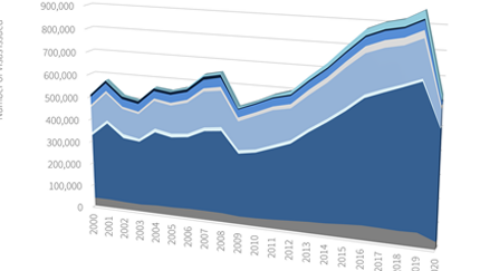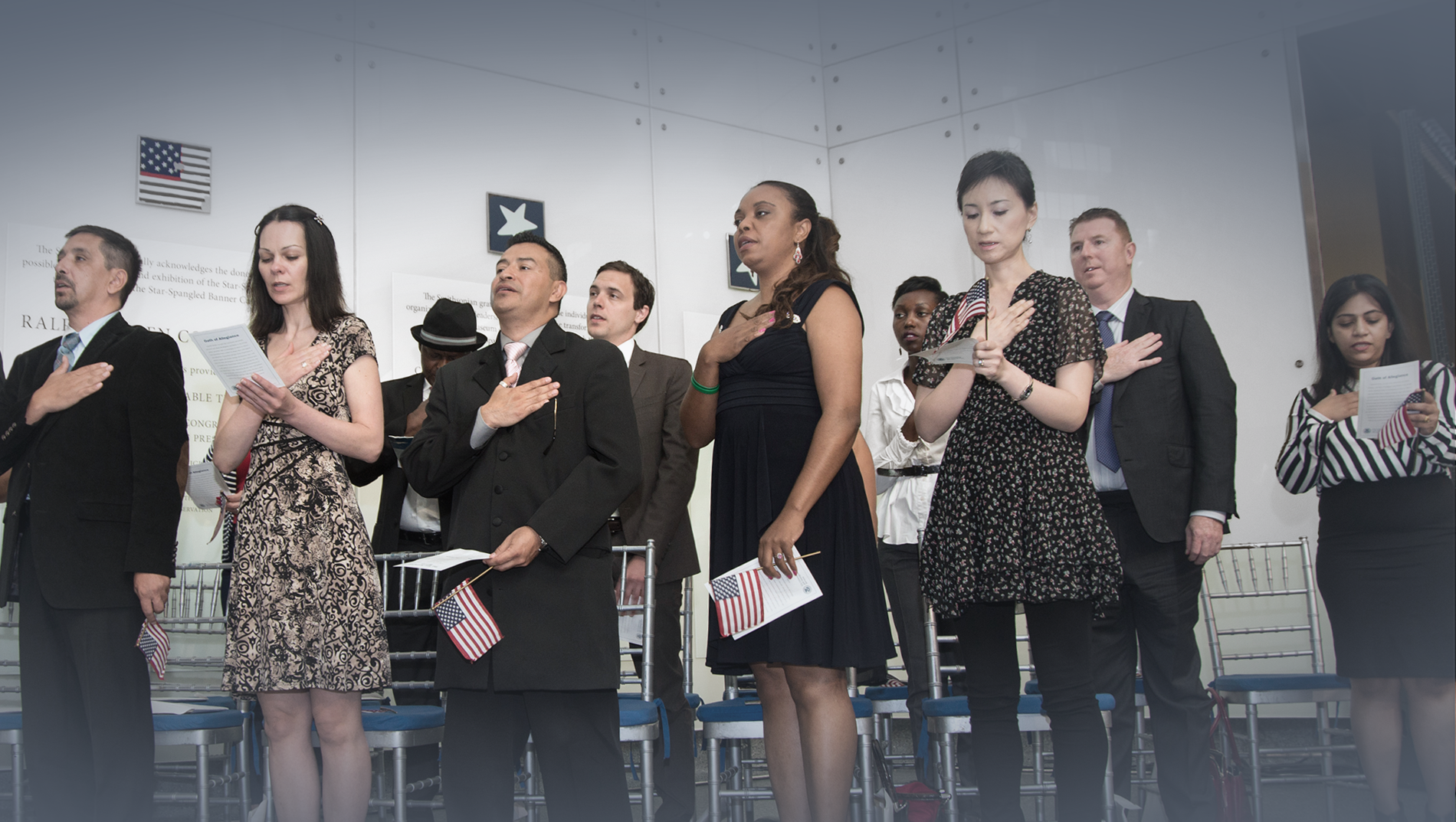Immigration 101
How the United States Immigration System Works
- How the Immigration System Works
- June 24, 2024
U.S. immigration law is very complex, and there is much confusion as to how it works. This fact sheet provides basic information…
Read More
Birthright Citizenship in the United States
- Birthright Citizenship
- October 16, 2024
This fact sheet explains birthright citizenship, the Fourteenth Amendment, and its interpretations. Who is…
Read More
Asylum in the United States
- Asylum
- August 27, 2014
Asylum seekers must navigate a difficult and complex process that can involve multiple government…
Read More
Fuzzy Math: The Anti-Immigration Arguments of NumbersUSA Don’t Add Up
According to the anti-immigration group NumbersUSA, immigration to the United States is all about arithmetic: immigration increases the U.S. population, and more people presumably means more pollution, more urban sprawl, more competition for jobs, and higher taxes for Americans who must shoulder the costs of “over-population.” At first glance, this argument is attractive in its simplicity: less immigration, fewer people, a better environment, more jobs, lower taxes. However, as with so many simple arguments about complex topics, it is fundamentally flawed and misses the point. “Over-population” is not the primary cause of the environmental or economic woes facing the United States, so arbitrary restrictions on immigration will not create a cleaner environment or a healthier economy. Read More

Employment-Based Visa Categories in the United States
Current U.S. immigration law provides several paths for foreign workers to enter the United States for employment purposes on a temporary or permanent basis. This fact sheet provides basic information about how the employment-based U.S. immigration system works. Read More

The New Electoral Landscape and What It Means for Immigration Reform
IPC has compiled this one-stop analysis of all the available data on the Asian, Latino and New American vote and shows how and why they voted the way they did in the 2008 election cycle. The report features a variety of early, exit and election-day polling which tells the story of not only a record rate turnout, but also provides insight into the greatest areas of concern for these voters. It also explores early signals from the new administration and congress with respect to immigration reform. The 2008 elections clearly demonstrated the growing power of the Latino, Asian, and immigrant vote. Not only did these groups turn out in record numbers, they also overwhelmingly rejected anti-immigrant politicians who attempted to use immigration as a wedge issue through hateful campaign rhetoric that is quickly becoming an unhealthy trademark of the Republican Party. The following report illustrates the growing electoral clout of Latinos, Asians, and New Americans; provides data on how and why they voted; and demonstrates that immigration was an issue that motivated them to the polls. Election results from races in which immigration was a hot issue show that immigrant-bashing did not work as a campaign strategy. The report also provides evidence that a majority of all voters favor comprehensive immigration reform, and details early signs from the incoming administration and Congress that point to a new direction in immigration policy. Politicians of all stripes would be wise to listen to the voices of ethnic and New American voters and not take them for granted. The analysis provided in the following pages points to the strength and growth of what may be the most important voting bloc in 21st century politics—one that now has the power profoundly to change American elections in the years to come. Read More

Did My Family Really Come “Legally”?
Many people assume that their family immigrated to the United States legally, or did it “the right way.” In most cases, this statement does not reflect the fact that the U.S. immigration system was very different in the past and that their families might not have been allowed to enter had today’s laws been in effect. Read More

Election 2008: The Importance of Latinos and Immigrants to the Economies and Electorates of the “Super Tuesday” States
During the presidential primaries, candidates and the media focused a great deal of attention on the debate over how immigrants impact state economies and the fiscal balance of state treasuries. At the same time, political pundits and pollsters speculated on the electoral influence of immigrants and Latinos at the voting booth. Below is a brief analysis of the impact that both Latinos and immigrants have on the economies and electorates of the “Super Tuesday” states. Read More

Election 2008 Recap: The Electoral Landscape and What it Means for Immigration Reform
IPC has prepared a fact sheet to remind policymakers, the press, and the public about the enormous influence of the immigrant, Latino, and Asian vote in the 2008 elections. Read More

The Politics of Contradiction: Immigration Enforcement vs. Economic Integration
Since the mid-1980s, the federal government has tried repeatedly, without success, to stem the flow of undocumented immigrants to the United States with immigration-enforcement initiatives: deploying more agents, fences, flood lights, aircraft, cameras, and sensors along the southwest border with Mexico; increasing the number of worksite raids and arrests conducted throughout the country; expanding detention facilities to accommodate the hundreds of thousands of undocumented immigrants apprehended each year; and creating new bureaucratic procedures to expedite the return of detained immigrants to their home countries. At the same time, the economic integration of North America, the western hemisphere, and the world has accelerated, facilitating the rapid movement of goods, services, capital, information, and people across international borders. Moreover, the U.S. economy demands more workers at both the high-skilled and less-skilled ends of the occupational spectrum than the rapidly aging, native-born population provides. The U.S. government’s enforcement-without-reform approach to undocumented immigration has created an unsustainable contradiction between U.S. immigration policy and the U.S. economy. So far, the economy is winning. Read More

Today’s Immigrant Woman Entrepreneur
Immigrant women entrepreneurs are rapidly making their mark in the U.S. business sector, in every region of the country and across a large range of industries. Today, immigrant women of the post-1960s wave of immigration comprise one of the fastest growing groups of business owners in the United States. This study examines the rise of immigrant women entrepreneurs and profiles them as a group using data from the 2000 Decennial Census and other sources. Read More

Thinking Ahead About Our Immigrant Future: New Trends and Mutual Benefits in Our Aging Society
By Dowell Myers, Ph.D. There are two stories now being told about immigration and the future of America. Each has some basis in fact, although one is based on newer trends and is more optimistic than the other. These stories differ in their answers to three crucial questions: whether immigration to the United States is accelerating out of control or is slowing; how much immigrants are assimilating into American society and progressing economically over time; and how important immigrants are to the U.S. economy. The pessimistic story—in which immigration is portrayed as increasing dramatically and producing a growing population of unassimilated foreigners—draws upon older evidence. But more recent data and analysis suggest a far more positive vision of our immigrant future. Immigration has not only begun to level off, but immigrants are climbing the socio-economic ladder, and will become increasingly important to the U.S. economy as workers, taxpayers, and homebuyers supporting the aging Baby Boom generation. Read More

The Myth of Immigrant Criminality and the Paradox of Assimilation
Because many immigrants to the United States, especially Mexicans and Central Americans, are young men who arrive with very low levels of formal education, popular stereotypes tend to associate them with higher rates of crime and incarceration. The fact that… Read More
Make a contribution
Make a direct impact on the lives of immigrants.

